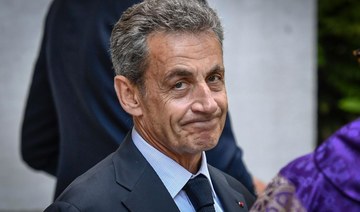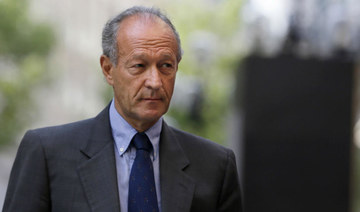PARIS: Former French President Nicolas Sarkozy wants authorities to drop an investigation into alleged illegal financing of his 2007 campaign by the regime of late Libyan leader Muammar Qaddafi, after a central accuser backtracked on claims that he had handed Sarkozy’s team suitcases of Libyan cash.
Sarkozy, who denies wrongdoing, has facecd preliminary corruption charges in the case, under investigation since 2013.
The probe gained traction when French-Lebanese businessman Ziad Takieddine told news site Mediapart in 2016 that he had delivered suitcases from Libya containing €5 million ($6.2 million) in cash to Sarkozy and his former chief of staff.
The ex-president jumped on the first reports from BFM TV and Paris Match saying: “The truth is out at last.”
On Wednesday, Takieddine reversed course, telling BFM television from Lebanon: “It’s not true. Mr. Sarkozy did not receive financing ... there was no financing of Sarkozy’s presidential campaign.”
Sarkozy released a statement late Wednesday on social networks saying: “The truth is emerging at last ... he never gave me money, there was never illegal financing of my 2007 campaign.”
Sarkozy said he would ask investigators to drop the charges against him, and sue Takieddine for defamation.
“For seven-and-a-half years, the investigation has not discovered the slightest proof of any illegal financing whatsoever,” he posted on Facebook.
“The chief accuser recognizes his lies,” Sarkozy added. “He never gave me money, there was never illegal financing of my campaign in 2007.”
Investigators are examining claims that Qaddafi’s regime secretly gave Sarkozy €50 million overall for his winning 2007 French campaign. The sum would be more than double the legal campaign funding limit at the time, €21 million, and would violate French rules against foreign campaign financing.
Sarkozy’s relationship with Qaddafi was complicated. In 2007, Sarkozy welcomed Qaddafi to France with high honors. Sarkozy then put France at the forefront of NATO-led airstrikes that helped rebel fighters topple Qaddafi’s regime in 2011.
Sarkozy and Takieddine have faced other legal troubles in France. The former president faces trial later this month in an unrelated corruption case.
Takieddine, who is in Beirut on the run from French justice in another shady financing affair, put out a video saying the instructing magistrate had twisted his words.
“I am saying loud and clear the magistrate ... really wanted to turn it the way he wanted and make me say things which are totally contradictory to what I said,” the 70-year-old said.
“There was no financing of Sarkozy’s presidential campaign,” he added.
Sarkozy announced he would instruct his lawyers to seek to halt the case against him and sue Takieddine for defamation.
French prosecutors last month said they had charged Sarkozy for “membership in a criminal conspiracy” after more than 40 hours of questioning over four days, prosecutors told AFP.
It adds to charges already filed in 2018 of “accepting bribes,” “benefitting from embezzled public funds” and “illegal campaign financing.”
The October charge was seen to increase the chance of a trial for Sarkozy, who was already poised to become the first former French president in the dock on corruption charges.
Prosecutors suspected that Sarkozy and his associates received tens of millions of euros from Qaddafi’s regime to help finance his election bid.
Sarkozy, who was president from 2007 to 2012, has always denied wrongdoing.
He has been under pressure since 2012, when the investigative website Mediapart published a document purporting to show that Qaddafi agreed to give Sarkozy up to €50 million ($59 million at current rates).
But four years later, in 2011, Sarkozy was a driving force behind the international military invention that drove Qaddafi from power.
A trained lawyer, Sarkozy has fought the claims of Libya cash by citing presidential immunity, and arguing there is no legal basis in France for prosecuting someone for misusing funds from a foreign country.
He has faced a litany of legal woes since leaving office, including charges relating to fake invoices orchestrated by executives of the Bygmalion public relations firm to mask overspending on his failed 2012 re-election campaign.
In a third case, Sarkozy faces charges of trying to obtain classified information from a judge on an inquiry into claims that he accepted illicit payments from L’Oreal heiress Liliane Bettencourt for his 2007 presidential campaign.
Sarkozy was cleared over the Bettencourt allegations in 2013.
Sarkozy seeks closure of Libyan corruption case as witness drops claim
Short Url
https://arab.news/89xyx
Sarkozy seeks closure of Libyan corruption case as witness drops claim













